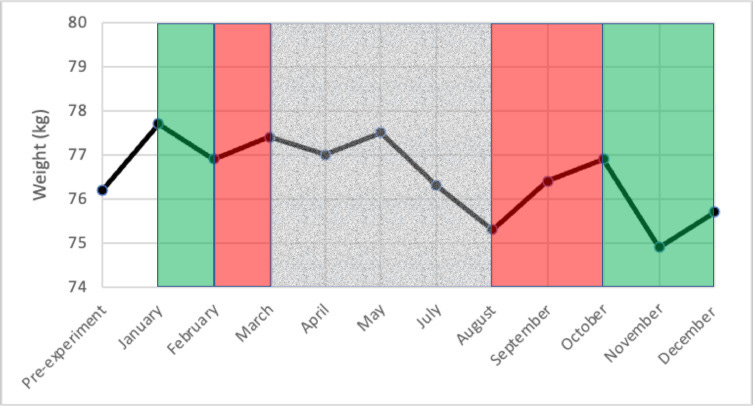Should you give up eating meat? This is a complicated issue with many ethical, cultural, and health issues.
This week we dig into a recent self-experiment that bears many lessons to other personal scientists.
An N-of-1 Self-Experiment with Veganism
Eric Robinson is a psychology professor in the UK who found himself motivated to give up meat and go full-on vegan. Although at first he did this to impress his girlfriend, he ended up turning it into a carefully-managed personal science experiment published this week in Psychology and Behavior: Veganism and body weight: An N of 1 self-experiment. Even better, he wrote a more readable general audience summary in the online news magazine The Conversation.
His first goal was to see if the new diet helped him lose weight. Yes, he concludes:

But his second goal — to see if it changed his mental health — was inconclusive.
He measured his well-being using two tests: PHQ-9 has been clinically validated and is often used by mental health professionals to assess depressive symptoms. GAD-7 is a similar test designed to assess anxiety. Unlike the weight loss measurements, neither of these mental health scores showed a significant difference.
You can try the same PHQ-9 test yourself online. Answer nine simple questions, e.g. “over the past 2 weeks, how often have you felt little interest or pleasure in doing things?” (Not at all, Several days, More than half, Nearly every day). GAD-7 is also available online and is even easier: seven quick questions (e.g. “How many days have you had trouble relaxing”).
Robinson ultimately decided to stick to his new diet/lifestyle, despite his breakup with the vegan girlfriend. It may be too early to tell, though, since the vast majority of vegan/vegetarians go back to meat eating, most of them within three months.
Although we’re impressed with his self-experimentation, especially his choice to publish for a wider readership, we note two limitations of his studies, both resulting from the very short time frame (under one month for each phase). First is the idea that he lost weight due to the dietary change itself. The second is the crude measurement of mental health.
Food author Michael Pollan is one of many diet observers who note that weight loss doesn’t seem to depend on which aisle of the grocery store you give up. Most people lose weight, at least at the beginning, simply because their overall calorie consumption naturally drops when they make a conscious decision to stop eating foods they used to eat. A month or two of this experiment is hardly enough to prove a pattern one way or another.
Mental health, too, is notoriously difficult to measure, especially on such small time scales. Over a week or a month or two, it’s almost impossible to control well for life events that have nothing to do with the experiment: stressful school or work assignment, relationship troubles, an unexpected health or physical issue, etc.
The obvious takeaway: don’t read too much into the results of this one experiment.
About Personal Science
Nullius in verba The 1660 motto of the Royal Society: “take nobody’s word for it” is a good guideline for the rest of us who are curious and want to use the techniques of science to solve everyday problems as we learn more about the world around us.
We publish this newsletter every Thursday, free to anyone who wants to be Personal Scientist. Paid subscribers have access to our series on “Unpopular Science”, in which we dig into ideas that are too controversial or outside the mainstream consensus to discuss in a public forum. We figure if you’re willing to spend the money to subscribe, we’ll trust you to read our most controversial ideas in good faith.
As always, please let us know if there are other topics you’d like to discuss.



Body weight can also have seasonal trends: I usually lose a bit of weight over the summer (more hiking), regardless of diet...